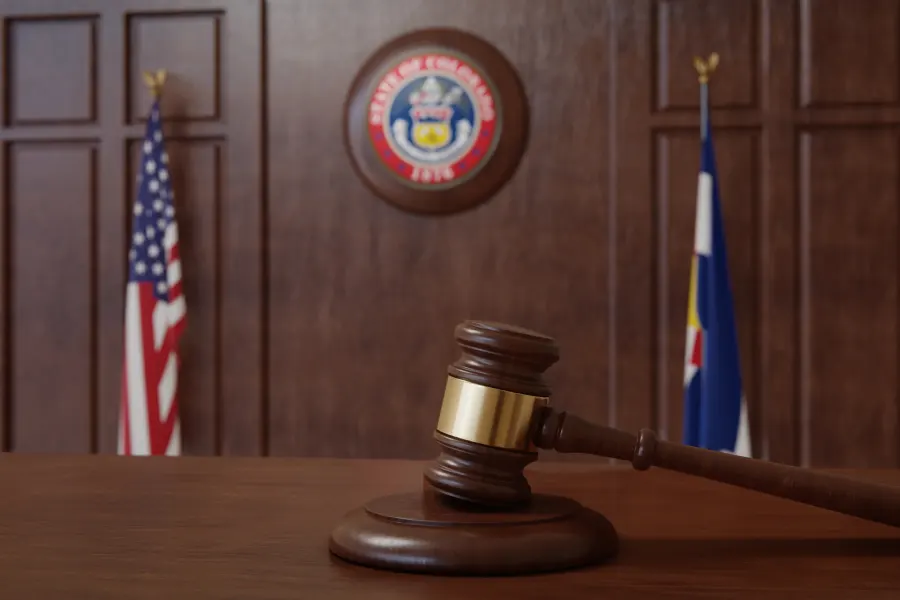The Colorado domestic violence laws treat domestic violence as a sentence enhancer rather than a standalone crime, meaning that underlying offenses like assault, harassment, or criminal mischief carry additional mandatory penalties when committed against intimate partners, family members, or household members. These enhanced penalties include mandatory jail time, required counseling programs, and automatic protective order restrictions that can substantially impact both the accused and the victim’s lives. For personalized guidance, consult a Denver domestic violence lawyer.
What Are Colorado Domestic Violence Laws?
Colorado’s domestic violence laws enhance penalties for crimes committed against intimate partners, family members, or household members, treating domestic violence as an aggravating factor rather than a separate offense. Under Colorado law, specifically C.R.S. 18-6-801, when a crime is committed involving domestic violence, the court must impose additional mandatory sentences, including jail time and counseling requirements. The state defines domestic violence broadly to include physical harm, threats, intimidation, and coercion between people in qualifying relationships, with mandatory arrest policies requiring law enforcement to make an arrest when probable cause exists.
Definition And Scope Of Domestic Violence In Colorado
Colorado law defines domestic violence comprehensively under C.R.S. 18-6-800.3 as an act or threatened act of violence upon a person with whom the actor is or has been involved in an intimate relationship. The statute doesn’t create new crimes but instead enhances existing offenses when they occur in domestic contexts.
Legal Definition Under Colorado Law
The legal framework encompasses any criminal act that’s used as a method of coercion, control, punishment, intimidation, or revenge directed against someone with whom the perpetrator has or had an intimate relationship. This includes psychological abuse, financial control, and threats that create fear.
You don’t need physical contact for domestic violence charges to apply. Threatening gestures, destroying property to intimidate, or using children as weapons of control all qualify under Colorado’s broad definition. The law recognizes that domestic violence often involves patterns of behavior designed to maintain power and control over another person.
Qualifying Relationships And Household Members
Colorado’s domestic violence statutes apply to current or former spouses, dating partners, and individuals who have lived together or share a child, as defined by an “intimate relationship.” Understanding these relationship categories is important because the domestic violence enhancement applies automatically once the prosecution establishes that a qualifying relationship exists. The breadth of these definitions means that many people may be surprised to learn their situation falls under Colorado’s domestic violence statutes.
Types Of Conduct That Constitute Domestic Violence
- Physical violence – Hitting, slapping, pushing, restraining, or any unwanted physical contact
- Threats and intimidation – Verbal or gestural threats that create reasonable fear of harm, even without physical contact
- Property destruction – Breaking dishes, punching walls, or damaging belongings when intended to intimidate or control
- Sexual assault and coercion – Forced sexual contact or using sex as a weapon of control within intimate relationships
- Economic abuse – Preventing employment, controlling access to finances, or sabotaging economic independence
These broad categories reflect Colorado’s recognition that domestic violence encompasses various tactics used to maintain power and control over intimate partners. The law’s expansive definition means that conduct that might seem relatively minor in other contexts can trigger serious criminal penalties when it occurs within qualifying relationships.
First Offense Penalties And Criminal Consequences
Colorado doesn’t treat first-time domestic violence offenders leniently. Even without a prior criminal history, you will face mandatory requirements such as domestic violence treatment and protection orders, and in some cases, mandatory jail time depending on the underlying offense.
Mandatory Minimum Sentences For First-Time Offenders
Jail time may be imposed for domestic violence convictions in Colorado, but there is no universal mandatory minimum of 36 hours for all offenses. The requirement depends on the underlying charge and judicial discretion.
You’ll also face mandatory domestic violence treatment as part of your sentence. The number of hours is determined by an evaluation, with 36 hours being common but not guaranteed. The treatment must be completed at your own expense, which can cost several hundred dollars.
Enhanced Penalties For Domestic Violence Cases
When domestic violence enhances an underlying crime, the penalties can escalate, and offenses that might otherwise result in probation may carry additional requirements or jail time. The domestic violence designation also creates a permanent criminal record that can’t be sealed or expunged under current Colorado law.
After three prior domestic violence convictions, a fourth offense can be charged as a Class 5 felony under Colorado law. Sentencing for domestic violence offenses may be combined with penalties for the underlying crime, but there is no universal requirement for consecutive sentences.
Jail Time, Fines, And Court Costs
Beyond the mandatory minimum jail sentence, you’ll face substantial financial penalties. Fines can range from hundreds to thousands of dollars depending on the underlying offense. Court costs, probation fees, and treatment program expenses quickly add up to significant amounts.
Many counties also require domestic violence offenders to pay for the cost of any protective order proceedings, including service fees and court administrative costs. If you’re sentenced to probation, expect monthly supervision fees throughout the duration of your sentence.
Mandatory Counseling And Treatment Programs
Colorado requires all domestic violence offenders to complete state-approved treatment programs. These aren’t simple anger management classes but specialized programs designed to address the power and control dynamics underlying domestic violence.
The treatment typically involves group sessions over several months. You must pay for the program yourself, and failure to complete it successfully can result in additional jail time or extended probation.
Protection Orders And Emergency Restraining Orders
Temporary Restraining Orders (TROs)
When domestic violence charges are filed, the court typically issues a temporary restraining order automatically. This order takes effect immediately and prohibits all contact between the accused and the alleged victim, often regardless of whether they live together or share children.
TROs can require you to leave your shared home, surrender firearms, and avoid all contact with the protected person. Violation of any provision in a temporary restraining order constitutes a separate criminal offense that can result in additional jail time and penalties.
Permanent Restraining Orders And Civil Protection Orders
After criminal proceedings conclude, victims can seek permanent protective orders through civil court. These orders can last for years and impose long-term restrictions on contact, proximity to the protected person’s home or workplace, and possession of firearms.
Civil protection orders have a lower burden of proof than criminal cases, meaning a victim can obtain one even if criminal charges are dismissed or you’re found not guilty. The standard is preponderance of evidence rather than beyond a reasonable doubt.
Violations Of Protection Orders
Violating any protection order, whether temporary or permanent, constitutes a separate crime in Colorado. First violations are typically misdemeanors, but repeat violations can become felonies carrying substantial prison time.
Even inadvertent contact can trigger violation charges. Text messages, social media contact, showing up at places where you know the protected person will be, or having third parties deliver messages can all constitute violations with serious legal consequences.
Criminal Defense Rights And Legal Protections
Constitutional Rights During Domestic Violence Proceedings
You have the right to remain silent and cannot be compelled to testify against yourself. This right applies during police questioning, court proceedings, and any interactions with law enforcement or court personnel investigating your case.
You’re entitled to legal representation, and if you cannot afford an attorney, the court must appoint one for you. Given the mandatory minimum penalties and long-term consequences of domestic violence convictions, having experienced legal counsel is particularly important in these cases.
Common Defenses In Domestic Violence Cases
- Self-defense – Colorado law allows reasonable force to protect yourself from imminent harm, even against intimate partners or family members
- False accusations – While domestic violence allegations are typically genuine, false accusations can occur in some cases, sometimes motivated by custody disputes, divorce proceedings, or relationship conflicts
- Lack of evidence or witness credibility issues – Cases often rely heavily on victim testimony, and inconsistent or contradicted claims may create reasonable doubt
Working With Criminal Defense Attorneys
Domestic violence cases involve complex legal and procedural issues that require specialized knowledge. An experienced Denver domestic violence attorney can help you understand your options, negotiate with prosecutors, and protect your rights throughout the process. Early intervention by legal counsel can sometimes prevent charges from being filed or result in reduced charges that don’t carry the domestic violence enhancement. Even after charges are filed, skilled advocacy can make the difference between conviction and dismissal or between jail time and alternative sentencing options.
Long-Term Consequences And Collateral Effects
Impact On Employment And Professional Licenses
Many employers conduct background checks, and a domestic violence conviction will appear on standard criminal background searches. Certain professions, including healthcare, education, and law enforcement, may automatically disqualify applicants with domestic violence convictions.
Professional licensing boards often require disclosure of criminal convictions and may suspend or revoke licenses based on domestic violence charges. Even if you’re already licensed, a conviction can trigger disciplinary proceedings that threaten your career and livelihood.
Housing And Rental Application Consequences
Landlords frequently screen potential tenants for criminal history, and domestic violence convictions can make finding housing difficult. Many rental applications specifically ask about violent crimes, and domestic violence convictions typically fall into this category.
Public housing authorities may also deny applications or terminate existing leases based on domestic violence convictions, creating additional barriers to stable housing for both offenders and their families.
Gun Rights And Firearm Restrictions
Federal law prohibits anyone convicted of domestic violence from possessing firearms, regardless of whether the underlying offense was a misdemeanor or felony. This prohibition applies to law enforcement officers, military personnel, and civilians alike.
Colorado law reinforces these federal restrictions, and violating firearm prohibitions can result in additional federal charges carrying substantial prison sentences. The prohibition typically lasts for life, with very limited exceptions for certain types of cases.
Legal Remedies And Resources For Victims
Civil Remedies Beyond Criminal Prosecution
Victims can pursue civil lawsuits against their abusers seeking monetary damages for medical expenses, lost wages, pain and suffering, and other harm caused by the domestic violence. Civil cases proceed independently of criminal prosecutions and have different standards of proof.
Property damage, emotional distress, and ongoing therapy costs can all form the basis for civil damage claims. Some victims find civil remedies more satisfying than criminal prosecution because they maintain more control over the process and outcome.
Victim Compensation Programs
Colorado’s Crime Victim Compensation Program provides financial assistance to victims of violent crimes, including domestic violence. The program can help pay for medical expenses, counseling costs, lost wages, and other expenses directly related to the criminal conduct.
Support Services And Advocacy Organizations
Numerous organizations throughout Colorado provide free services to domestic violence victims, including emergency shelter, legal advocacy, counseling, and safety planning. The Colorado Coalition Against Domestic Violence coordinates statewide resources and maintains a 24-hour hotline for crisis intervention.
Local advocacy programs can help victims navigate the legal system, understand their rights, and access available resources. Many also provide court accompaniment services to help victims feel more comfortable during legal proceedings.
Colorado’s domestic violence laws reflect the state’s commitment to addressing these serious crimes through enhanced penalties, mandatory treatment, and comprehensive victim protections. Whether you’re facing charges or seeking protection from abuse, understanding these laws and your rights under them is necessary for navigating the legal system effectively and protecting your interests throughout the process.
Do You Need Legal Help with Your Colorado Criminal Charges?
If you or someone you love is facing criminal charges in Colorado, don’t wait — contact the Colorado criminal defense lawyers at Prager Law today. Criminal charges are terrifying, and you deserve more than a cookie-cutter defense. At Prager Law, we provide personalized legal representation backed by real trial experience and insider knowledge of how prosecutors think.
Founding attorney Steve Prager is a former supervisor in the El Paso County District Attorney’s Office. He’s handled more than forty jury trials and trained new prosecutors — giving him rare insight into how cases are built and, more importantly, where they fall apart. That experience can be the difference between a conviction and a second chance.
Call 720-303-1044 or contact us online to discuss your case. We’ll review your situation, explain your legal options, and start building a strategic defense — one built just for you.



